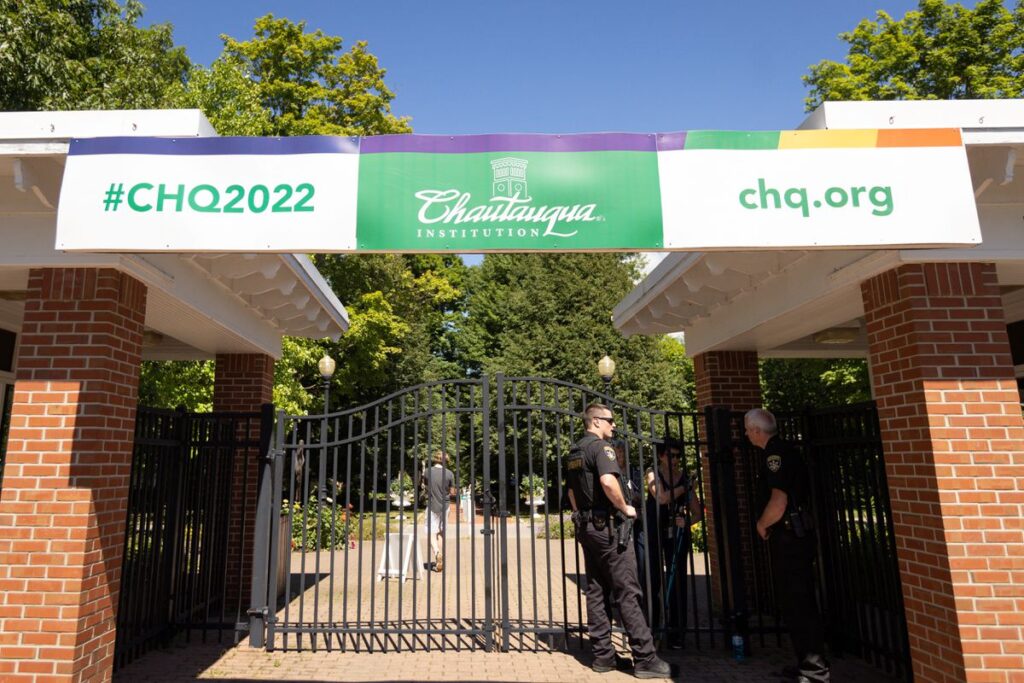Salman Rushdie Attack: Legacy Of Decades-Old Fatwa, Explained
Aug 19, 2022 | Pratirodh Bureau
A view of the Chautauqua Institution where Salman Rushdie was attacked on stage at an event in New York, U.S. on August 12, 2022 (Reuters)
In 1989, Iranian supreme leader Ayatollah Khomeini, who led the Islamic revolution in Iran ten years earlier, issued a fatwa – a religious edict – calling for the death of author Salman Rushdie. More than three decades later, at a literary event in New York state, a man who was not yet born when the fatwa was decreed is accused of stabbing the author.
The bounty on Rushdie’s head never went away, though the Iranian government did temporarily retreat from it in 1998. Still, 33 years have passed since the original tumult. Few would have predicted that the fatwa would find a willing taker in 2022.
Yet the political legacy of the edict was significant. To understand that, it’s important to see the fatwa in its historical context.
Many Muslims viewed Rushdie’s book The Satanic Verses as blasphemous, depicting the Prophet of Islam as being without scruples, and using the names of his wives for characters who played prostitutes. Muslims believe that Muhammad is insan-al-kamil – the complete human being, and the only one who has attained perfection. The original death sentence was not just against Rushdie, but also his publishers who “were aware of [the book’s] contents” and still went on to publish it.
Islamic law stipulates that a fatwa is valid only under the jurisdiction of a Muslim leader and where Sharia law applies. And Rushdie was neither an Iranian citizen nor in Iran at the time of the ruling.
Khomeini’s fatwa, however, was not circumscribed by political boundaries or international relations – it called on all Muslims to kill Rushdie. The fatwa effectively made the whole world Khomeini’s personal polity.
This was significant because it usurped Saudi Arabia’s position as the central focus of the Muslim world. Theological differences pervade the Iran-Saudi Arabia relationship. The majority of Muslims in Saudi Arabia are Sunnis while Iran has a Shia majority. And both countries have ambitions for regional dominance.
Iran’s relations with Saudi Arabia are also important in understanding the timing of the fatwa. In early 1989, it was apparent that Afghan insurgents backed by Saudi Arabia and the US were on the brink of victory against Afghanistan’s government and the Soviet troops that were supporting it. The USSR withdrew from the country on February 15 1989. But the fatwa, issued just a day earlier, took the limelight.
Saudi Arabia opposed the edict and attempted to work with other Muslim leaders to stop Khomeini using the episode to set himself up as the chief guardian and defender of Muslims and the Islamic world. However, the fatwa propelled The Satanic Verses and Rushdie’s alleged blasphemy into the international spotlight.
Footage even emerged of Muslims burning copies in front of the town hall in the British city of Bradford. For Iran, this was proof that religious leadership could transcend national boundaries, and a political ummah, or Muslim nation, was possible.
Ayatollah Khomeini died a few months after issuing the death sentence on Rushdie, but subsequent Iranian administrations have reaffirmed the fatwa. A brief reprieve by the pro-reform government of President Mohammad Khatami in 1998 was followed by hardliners upholding the legitimacy of the fatwa, even increasing the bounty to US$3.3 million (£2.7 million) in 2012.
It is not clear what connection Hadi Matar, the 24-year-old man now charged with the attempted murder of Salman Rushdie, might have had to the wishes of a now-dead leader vying for power in the Muslim world. Iran has officially denied links with the alleged attacker, who was born and raised in the US in a Lebanese family. His social media accounts allegedly show sympathies with the Iranian state, though it is believed he acted alone.
Iran’s foreign ministry spokesman Nasser Kanaani said that “no-one has the right to accuse Iran”, and that Rushdie and his supporters are to blame for the attack. Today, as in 1989, the fatwa against Rushdie illustrates the deep disconnect between Iran and much of the rest of the world, most recently seen in the country’s efforts to build nuclear weapons against the wishes of the international community.
Free Speech And Diaspora Muslims
The longest-lasting legacy of the fatwa has been as a symbol of the threat to free speech – considered a fundamental right in the west. At the time, Prime Minister Margaret Thatcher was clear on this: “It is an essential part of our democratic system that people who act within the law should be able to express their opinions freely”. Several other writers and translators with links to Rushdie have been attacked or killed over the years.
But for some in the Muslim world, freedom of speech should not give licence to attack the fundamentals of faith. It is because of this that the fatwa and its aftermath have also had a lasting impact on migrant identities in the UK and Europe.
After the second world war, large numbers of Muslims settled in urban areas, and debates about the compatibility of Muslims in the west gained traction. While many Muslims did not agree with Khomeini’s fatwa or the book burnings, the Rushdie affair contributed to turning diaspora Muslims into a self-conscious group, who knew that others viewed them through the lens of religion.
In the 33 years since it was issued, the fatwa has continued to be used as evidence by those who view Islam and the west as being fundamentally distinct civilisations, with an ever-present potential for violent confrontation.
